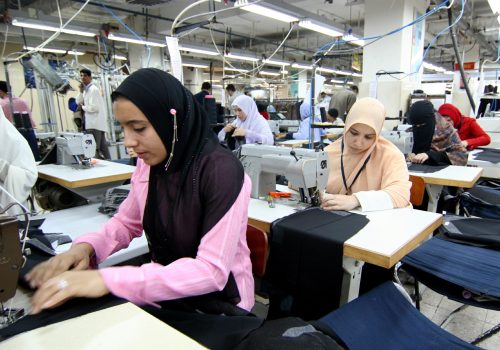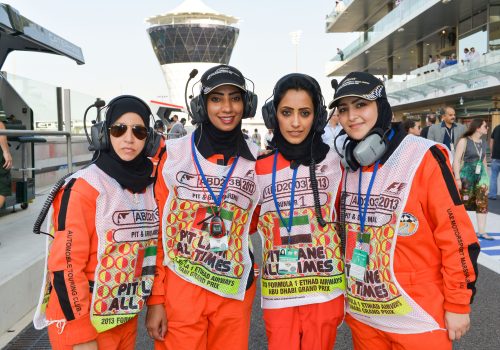Cultivating change: Women as catalysts for agricultural transformation in the MENA region
The United Arab Emirates (UAE) is preparing to launch its ambitious COP 28 agenda from November 30-December 12, which will become the most inclusive United Nations Climate Change Conference to date. Consequently, it’s worth looking at related topics in the Middle East and North Africa (MENA) region: the importance of diversity in innovation, how empowering women is generating unique, sustainable solutions, and why incorporating women into policymaking leads to better outcomes for all.
The MENA region is facing significant agriculture, food security, and water security challenges, as highlighted by the N7’s conference in March, which included an all-star, all-female panel: Women in Desert Tech. But, as evident from the panels of the day, these challenges still disproportionately impact women despite showcases of female-founded companies and technologies. According to the United Nations, women are more likely to be food insecure than men, as women face significant barriers to accessing and managing water resources, which are critical for agriculture and food production.
Gender inequality is one of the main reasons why women are disproportionately impacted by agriculture, food security, and water security issues in the MENA region. According to the UN, gender inequality and discrimination are pervasive in the region and pose significant barriers to sustainable development. Discriminatory laws and social norms hinder women’s access to resources, including land, credit, and water, limiting their ability to participate fully in agriculture and achieve food security.
In many countries in the MENA region, women face significant land access challenges, which have critical implications for agriculture and food production. According to a report by the International Center for Agricultural Research in the Dry Areas (ICARDA), “Women own less than 5 percent of the agricultural land in the MENA region, and they are often excluded from decision-making related to land management.” This can limit women’s ability to grow crops and earn an income, contributing to food insecurity.
Additionally, women in the MENA region face significant challenges related to access to credit, which can make it difficult for them to invest in their farms and improve their yields. Access to credit is hampered by “discriminatory laws, limited collateral, and limited access to financial services,” per a report by the World Bank. This further limits women’s ability to earn an income and achieve food security.
Water scarcity is a significant challenge in the MENA region, which ranks among the world’s most water-scarce regions. Women in the region are often responsible for collecting and managing water, which can be time-consuming and physically demanding. Furthermore, as a report by the World Bank notes, “women and girls in the MENA region spend up to six hours per day collecting water, which limits their ability to participate in education, employment, and income-generating activities.” Additionally, women in the region may face significant barriers to accessing water, including limited infrastructure and resources.
Engaging women in decision-making and leadership is critical for achieving sustainable and equitable solutions to the challenges facing agriculture, food security, and water security in the MENA region. This includes ensuring that women obtain access to equal resources and opportunities, including education, employment, and leadership roles.
One of the key ways to engage women in decision-making and leadership is through education and training. Providing women with access to education and training can help them develop the skills and knowledge they need to participate fully in agriculture, manage water resources, and achieve food security.
In addition to education and training, policies and programs that promote gender equality and women’s empowerment are needed to achieve sustainable and equitable solutions in the MENA region. Further research by UN Women finds that “gender-responsive policies and programs can promote women’s participation in decision-making and leadership, and ensure that their voices are heard in the development and implementation of policies and programs related to agriculture, food security, and water security.”
In conclusion, the challenges faced by the MENA region in agriculture, food security, and water security are not only pressing but disproportionately affect women. Gender inequality, discriminatory laws, and social norms limit women’s access to essential resources and opportunities, hindering their full participation in these critical sectors.
However, the path forward is clear: empowering women is not just a moral obligation but a strategic imperative. By engaging women in decision-making leadership roles and providing them with access to education and training, a wellspring of innovative solutions can be unlocked to address challenges in agriculture, food security, and water security. Furthermore, gender-responsive policies and programs will play a pivotal role in ensuring that women’s voices are heard and actively shape the policies and initiatives designed to foster sustainability and equity in the MENA region.
With this in mind, it’s important to remember the words of Mariam bint Mohammed Almheiri, the Emirati minister of climate change and environment, who highlights the power of inclusion and diversity in driving innovation: “Women have the power to become active contributors [in] driving agricultural [research and development]. As they are disproportionately affected by global issues such as climate change and world hunger, empowering women to offer trailblazing solutions is a moral obligation, especially in this region.” Almheiri is sure to unveil the UAE’s revolutionary approach to inclusive and sustainable climate change at COP 28.
Marcy Grossman is a nonresident senior fellow with the Atlantic Council’s Rafik Hariri Center and Middle East Programs and former Canadian ambassador to the United Arab Emirates.
Further reading
Wed, Aug 23, 2023
How expanding the QIZs can help economic development in the Middle East
MENASource By
The QIZ is a unique program that exceeds some of the most preferential agreements that the US has with other countries.
Tue, Feb 7, 2023
<strong>The UAE and Israel have a history of strong female leadership. Women must take substantial roles in the next phase of the Abraham Accords.</strong>
MENASource By Marcy Grossman
To have a sustained and enduring peace in the region after the signing of the Abraham Accords, women must also be equally included and reflected in policy-making, decision-making, and programming.
Mon, Feb 27, 2023
What the opening of the Abrahamic Family House Synagogue in the UAE means for the Jewish community and the rest of the world
MENASource By Marcy Grossman
The Abrahamic Family House, a mosque, church, and synagogue all sharing a multi-faith campus in Abu Dhabi is about to make its worldwide debut, opening its doors to the general public on March 1.
Image: Women seperate stigmas from saffron flowers in the village of Hizzine, Lebanon November 10, 2022. REUTERS/Issam Abdallah


